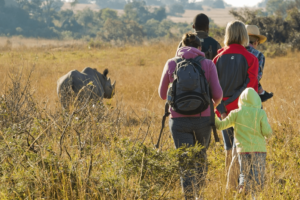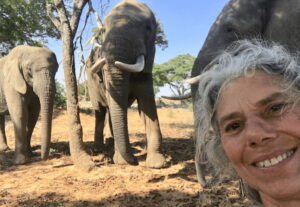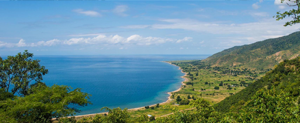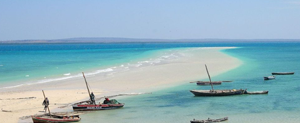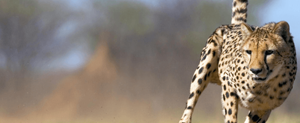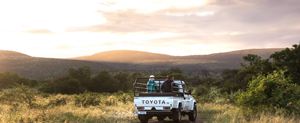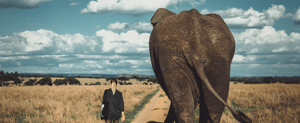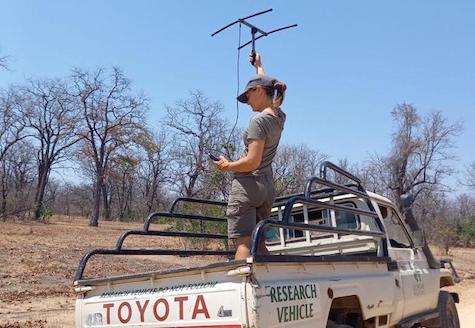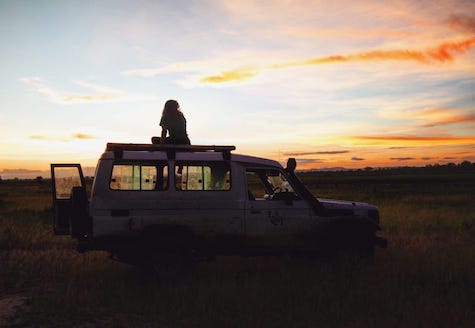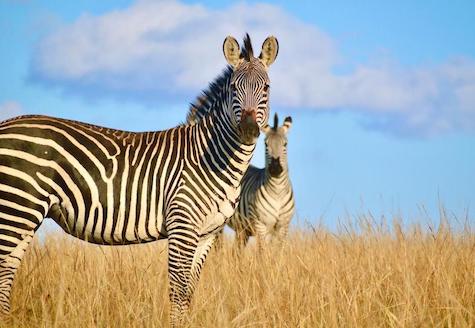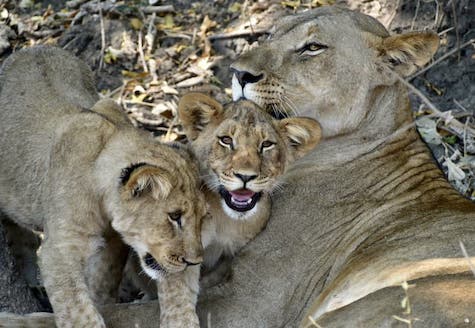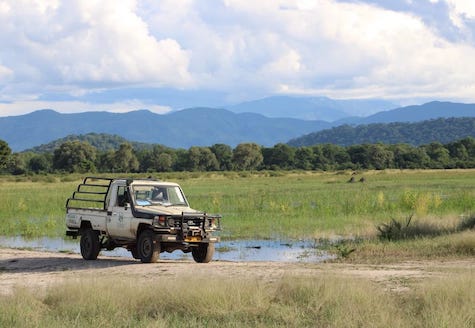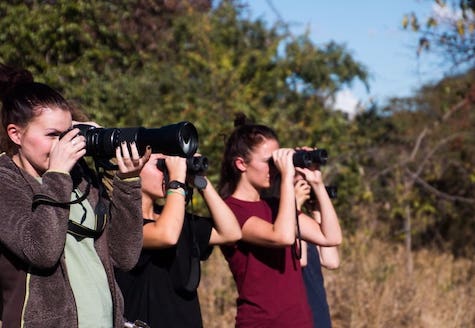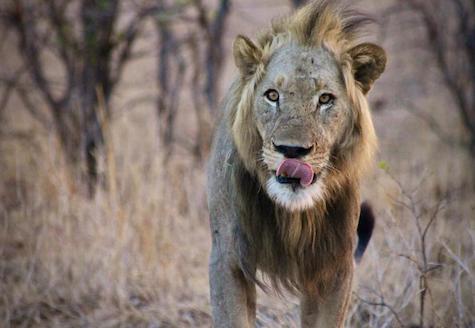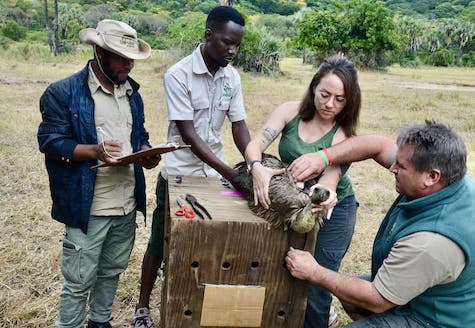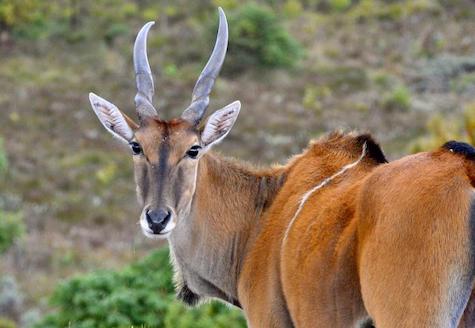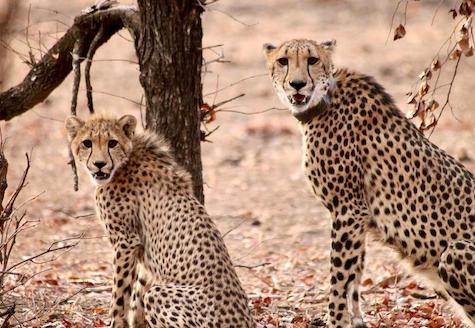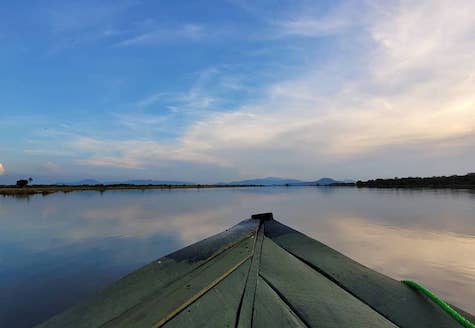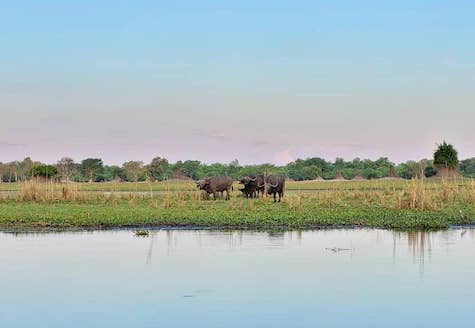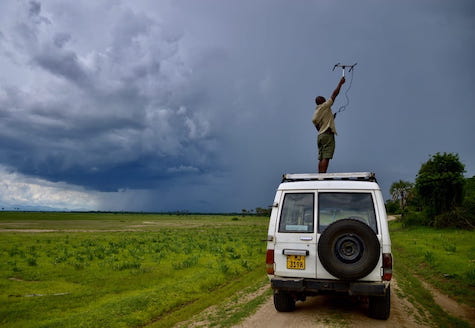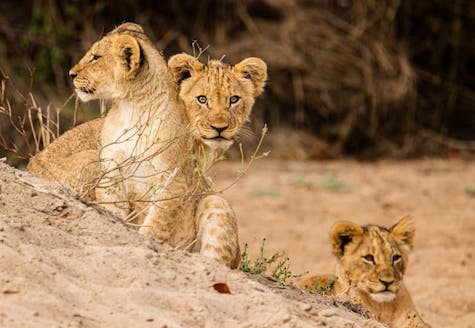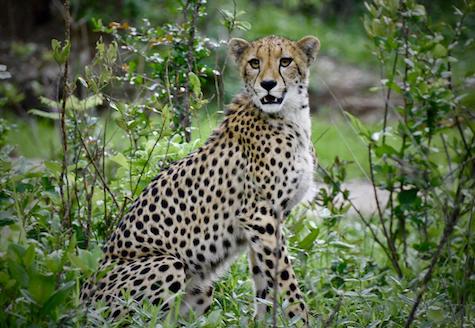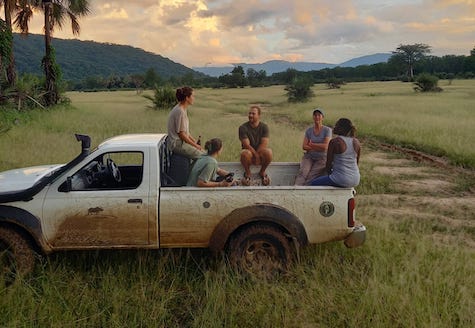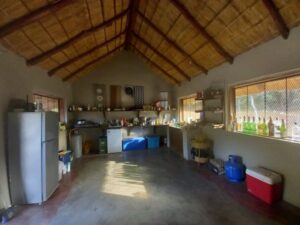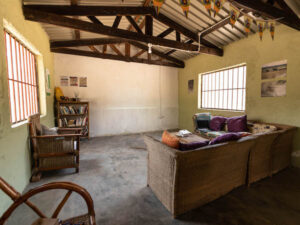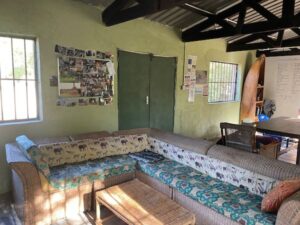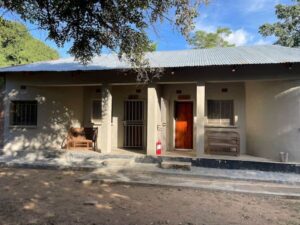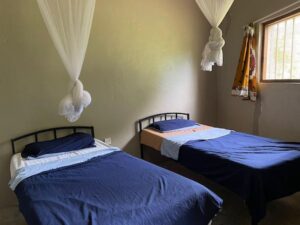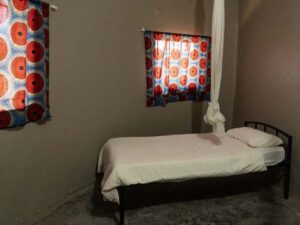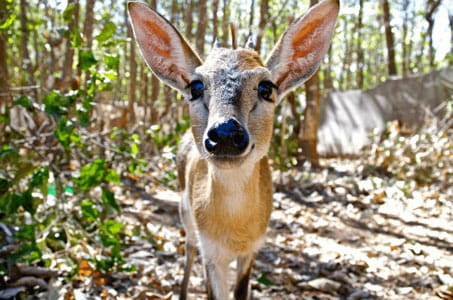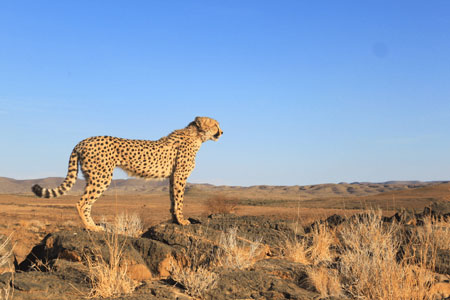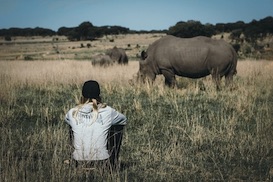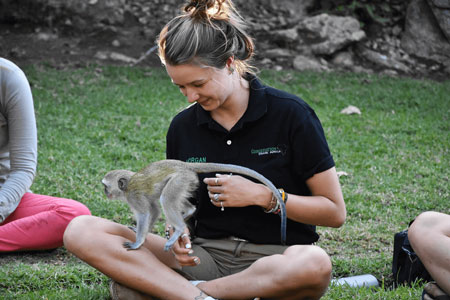Wildlife Research Volunteer
MALAWI
Malawi
2 weeks - 12 months
Tuesday
Up to 5 people
Age 18+
From £1,500
Malawi
2 - 12 weeks
Tuesday
Tues
Up to 5 people
Max 5
Age 18+
From £1,500
What's the project about?
Our wildlife research volunteer placement focuses on monitoring species of special concern in Malawi’s beautiful Liwonde National Park. You’ll monitor iconic and endangered species including lions, cheetahs, vultures and hyenas and collect data that will inform long-term conservation strategies. The park is also home to elephants, black rhinos, other antelopes and plains game and is one of the top parks in Malawi for sightings of lions and cheetah.
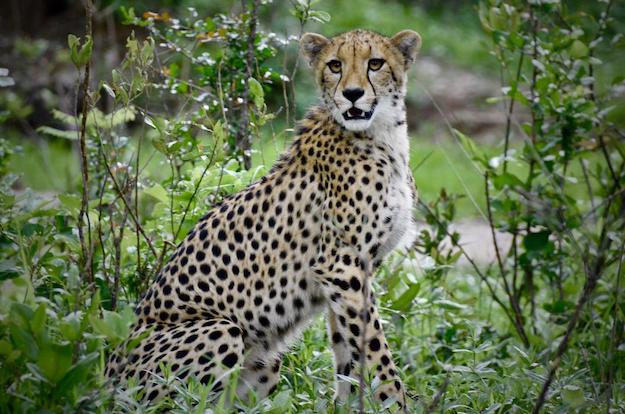
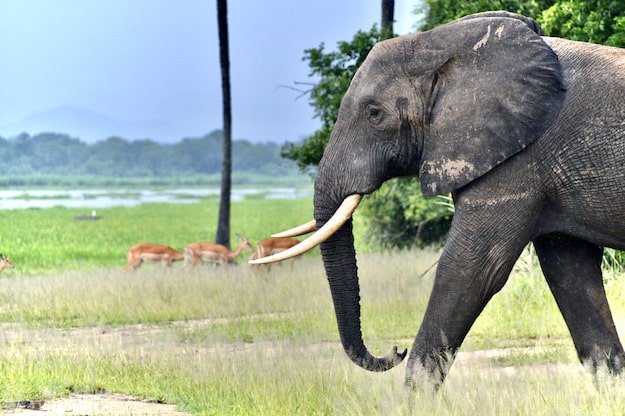
How will I be contributing?
Wildlife research volunteers work on a range of research and monitoring work which could include radio tracking large carnivores and managing camera traps. You will assist the research team in collecting data used for wildlife management within the park. Working as part of a team, you’ll learn how to conduct radio tracking, animal ID and data entry. You’ll also experience truly unique moments as you learn more about individual wild animals.
What makes this project ethical?
Liwonde National Park has been the subject of numerous successful wildlife reintroductions, especially of cheetahs and lions. Malawi is fast earning a name for itself as an emerging leader in African wildlife conservation. This means that wildlife research volunteers in Liwonde not only have the opportunity to spend time out in the field learning new skills but also contribute to research that makes a real difference, helping inform, guide and evaluate ongoing conservation actions in Malawi. This is your chance to be part of a conservation success story.
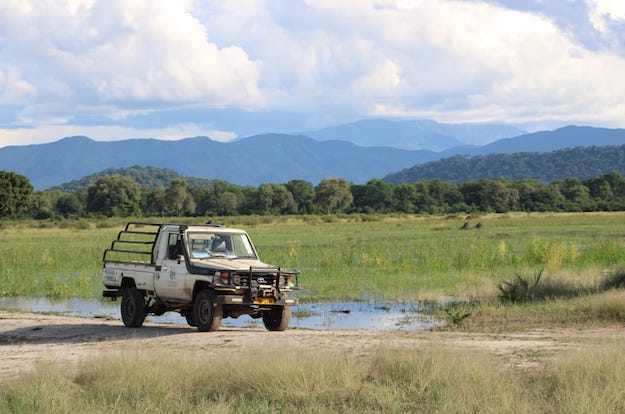
Project gallery
Malawi’s wildlife research projects cover a range of subjects. You will have the chance to partake in specific research work, whether it be radio tracking large carnivores or assisting on camera trap surveys.
You will learn first-hand about various conservation techniques and initiatives which are crucial to protecting Africa’s wildlife and wilderness areas.
Wildlife research volunteers choosing the Liwonde National Park placement will get involved with a number of important biodiversity monitoring projects.
What will I be doing?
Volunteers support the research team in the collection of data and observations to enable the park management to make informed conservation decisions and action for species of special concern. In Liwonde these species include lions, hyenas, cheetahs, vultures, zebras and antelopes.
Field work is intensive and requires early starts, long days and a lot of patience! You will get involved with tracking focus species, checking camera traps and recording sightings of all wildlife.
You will undoubtedly witness unique and special wildlife moments – such as the take-over of a pride by a new male lion; watching a female cheetah teaching her cubs how to hunt; or observing the dynamics between vultures and predators at a carcass.
Highlights:
- Tracking focus species using radio telemetry
- Checking camera traps
- Recording all wildlife sightings
You may get involved with some or all of the following activities:
- VHF tracking of collared cheetahs, lions and other species
- Behavioural observations of a huge variety of carnivores and other large and small mammals
- Developing identification kits for different animal species
- Vulture counts
- Camera trapping
- Vegetation surveys
- Carnivore surveys
- Data entry and GIS mapping
By the end of your stay in Liwonde you will be skilled in mammal identification, radio tracking, camera trapping and data entry, and you will have learnt to use the TimeLapse software for camera trap photo annotation.
Liwonde National Park
Located in the southern region of Malawi, Liwonde is home to Malawi’s largest populations of elephant, black rhino, cheetah and waterbuck. The area is managed by African Parks, in partnership with Malawi’s Department of National Parks and Wildlife.
Liwonde was at the heart of the largest elephant translocation in history, led by African Parks and known as ‘500 elephants’. In recent years Liwonde has been the subject of numerous wildlife reintroductions and it is now the top park in Malawi for carnivore sitings, especially cheetahs and lions.
Liwonde National Park
The research camp is located inside Liwonde National Park. The camp is very basic and rustic with shared accommodation, separate ablution blocks and a communal kitchen, dining area, work area and lounge.
Research volunteers stay in shared rooms – there are two double/twin rooms and a single room. Large dome tents may also be used if the camp is busy, but you will be advised of this. The camp has a large kitchen with basic cooking equipment and an outdoor fire pit. Ablutions are separate from the rooms and have flush toilets and hot showers.
Power at the research camp is intermittent and often powered by a backup power source, therefore we recommend limiting the number of devices that require charging.
Cooking and basic cleaning duties (washing up and tidying communal areas) are shared communally, with volunteers taking turns to cook for the group. You will be taken to a local shop and market to buy food each week. We recommend having a few ideas for simple meals with you – pasta and rice dishes, vegetarian curries, stews, chillis and salads are all good options. Please bear in mind that Malawian food is very basic and usually vegetarian, the project is very remote and the team has to work with seasons and availability. Please let us know in advance if you have any specific dietary requirements. Tea, coffee and drinking water are freely available.
Volunteers are responsible for clearing up after meals and there is a housekeeper who comes twice a week to do laundry, change bedding/towels and clean the bathrooms, bedrooms and communal areas.
Laundry can be done either by yourselves or one of the staff – detergent is provided.
Liwonde research camp does not have WiFi, but there is 3G cellular network coverage and staff will help you to get data for your mobile phone so you can contact home. It is best to make sure that your phone is unlocked prior to leaving home.
When can I volunteer?
Wildlife research volunteers at Liwonde and Vwaza Marsh should plan to arrive into Lilongwe International on a Tuesday, from where you will be collected and taken to the Malawi Wildlife Sanctuary for your first night’s accommodation. The wildlife research programme at Liwonde is open year-round.
Project pricing:
2 weeks: £1,500
3 weeks: £1,942
4 weeks: £2,445
5 weeks: £2,817
6 weeks: £3,155
7 weeks: £3,477
8 weeks: £3,769
9 weeks: £4,044
10 weeks: £4,287
11 weeks: £4,527
12 weeks: £4,744
All prices are in GBP.
Feedback from volunteers suggests that a 2 week programme is just not long enough to experience the project to its fullest. We highly recommend a minimum 4-6 week stay if possible!
What’s included in the cost?
- Project contribution: this goes directly to our project partner, and provides funding to ensure the programme can continue to meet its goals. For this project it will cover things like staff costs, equipment purchases, maintenance of buildings, equipment and vehicles, and fuel.
- Accommodation and three meals per day.
- Return airport transfers (Tuesdays).
- Volunteer t-shirt and local SIM card.
- Comprehensive orientation and supervision.
- Practical instruction by experienced staff members.
- Equipment and materials required to do your work.
What’s not included?
- Flights or travel to Lilongwe, Malawi.
- Visa fees (if applicable).
- Travel insurance (compulsory).
- Personal expenses such as souvenirs, drinks, snacks.
- Additional excursions.
- Administration fee (£40).
View our booking terms and conditions.
Support a high-impact organisation
The project started as a sanctuary but has grown to span wildlife rescue (large and small animals), animal welfare, education, advocacy, justice and research. It works with local community leaders, wildlife departments and law enforcement agencies to play a central role in Malawi’s fight to protect its wildlife and habitats.
Conserve Malawi’s wildlife heritage
Malawi’s wildlife and biodiversity face a number of threats, with habitat loss being one of the most serious. Wild animals are sometimes illegally kept or traded as pets, hunted for their meat, skin or scales, or injured through human-wildlife conflict. Environmental decline in Malawi has been hastened by rapid population growth, high poverty levels and a changing climate.
Be part of the bigger picture
However, Malawi is in the grip of a conservation revolution. In recent years, the Government has clamped down on wildlife criminals by passing tough laws and disrupting organised crime syndicates. Greater investment in protected areas has led to a boom in wildlife populations and the return to some areas of the ‘Big Five’.
This means that Malawi is fast earning a name for itself as an emerging leader in African conservation.
Volunteering in Malawi is a chance to be part of this fascinating conservation success story.
For the latest travel updates, please visit our Malawi destination page.
Who should volunteer on this project?
This wildlife research programme is a wonderful experience for volunteers of all ages, where you can experience Africa is a safe environment, work hard and see the impact that your contribution is having. Research volunteers come from all backgrounds and nationalities, with varied animal and wildlife experience. What all volunteers have in common is a love of wildlife and a passion for helping Africa’s threatened animals.
You should be able to communicate well in spoken English and be of reasonable fitness and mobility. Full training in data capture and data entry will be given.
How old do I need to be?
The minimum volunteering age for solo travellers is 18 years. There is no upper age limit.
How many people will there be?
The research programme takes up to 5 people at a time, plus staff members, so you will never be lonely or too crowded!
When can I join?
Volunteers should aim to arrive and depart on a Tuesday, although start dates can sometimes be flexible depending on availability and the payment of a transfer supplement. The project is open year-round.
When is the best time to come?
Lilongwe has a temperate climate for Africa. Wet season is from November/December to February/March, but it is actually very pleasant as rains last only an hour or so in the afternoons and make the country lush and green! Temperatures reach around 32oC in the hot months of October and November, and the coolest month is July, at around 25 oC, but still bright and sunny.
Do I get some time off?
Field work generally runs for five and half days a week. You will sometimes have downtime between morning and afternoon monitoring sessions, but the work is unpredictable and sometimes you may be required to spend full days in the field. In the evenings you will sit round the fire, listening to the night time sounds of the bush and marvel over the days events.
What excursions can I join?
It is well worth considering spending some time either before or after your programme exploring Malawi. Car hire is very affordable, and Lake Malawi is a short drive away, where you can swim, snorkel and relax on the beach!
You can also organise an excursion into the stunning South Luangwa National Park in Zambia for after your project – the perfect ending to your African adventure!
How long can I volunteer for?
The minimum project length is two weeks, and the maximum stay is three months. Student researchers can spend up to 12 months in Malawi.
How much spending money should I bring?
We recommend allowing £30 per week to cover personal expenses such as drinks, souvenirs, snacks, tips and internet usage. There are ATM machines at the airport and we suggest you withdraw cash there for your time at the sanctuary.
Do I need a visa?
Most nationalities can obtain a tourist visa upon arrival into Lilongwe or you can apply through the Malawian evisa system. The cost of this is usually around $50 payable in cash. It is your responsibility to check your visa eligibility prior to arrival.
What animals will I encounter?
Liwonde National Park is home to cheetahs, lions, black rhinos and elephants and is particularly renowned for its elephant sightings. Other large mammals include buffalo, antelope (including eland, the endangered sable antelope, kudu, impala and waterbuck), baboons, bushbuck and hippo. There is also a host of bird species, including lovebirds, bee-eaters, hornbills, sunbirds, parrots and rollers.
Be flexible and bear in mind that the variety and number of animals you encounter can and will change daily. The only thing we can guarantee is that you will have an amazing time!
Can I touch the animals?
Liwonde National Park is a wilderness area, home to some of Africa’s most iconic wildlife. On the research placement, you will not have the opportunity to interact with animals except from the safety of your game viewer!
What vaccinations do I need?
All volunteers should make sure their Tetanus is up to date and get a booster if you aren’t sure. Malawi is regarded as a high-risk malaria area, so anti-malarial prophylaxis must be taken. Consult your GP or travel clinic for further detailed medical advice. Please visit this UK government website for more details.
If you are not planning to volunteer at the wildlife sanctuary at all then a TB test is not mandatory. However, there are instances where there might be some activities in Liwonde and even at the Centre where they could get the opportunity to work very closely with wildlife and it would be great if the project team know that you have tested negative for TB. If you plan on combining your research placement with time at the sanctuary, then a TB test is required.
If you plan on joining the Malawi Wildlife Sanctuary Programme, a rabies vaccination is compulsory.
You must bring your vaccination certificate with you!
Students who are looking to conduct research as part of their BSc degree can apply to undertake student research.
The project can assist with some logistical support, but the research needs to be self-directed and you will need to secure your own supervisor. You will also be required to submit a full research proposal outlining your research question, methodology, equipment needs and plans.
The project is committed to expanding Malawi’s body of wildlife research in areas such as conservation biology, behavioural ecology, captive care and conservation medicine.
Where will I be based?
Student researchers will be based at an appropriate research site depending on your field of interest, the season and the capacity of project staff.
Who should apply?
You should be a BSc student.
Previous research project examples:
- Assessment of the release of rehabilitated vervet monkeys (Chlorocebus pygerythrus rufoviridus) in Kasungu National Park.
- Stress and parasitism in translocated vervet monkeys (Chlorocebus pygerythrus) in Malawi.
- Factors influencing the presence of blue monkeys (Cercopithecus mitis) in naturally fragmented Afromontane forest patches in Nyika National Park.
- Pre-release enrichment strategies to stimulate natural behaviour in common duiker and common genets.
- Surveillance for African Swine Fever vectors in pig kholas around Kuti Wildlife Reserve.
Student research fees
1 month: £1,360
2 months: £1,870
3 months: £2,380
Each additional month up to 12 months: £510 per month
Volunteer reviews
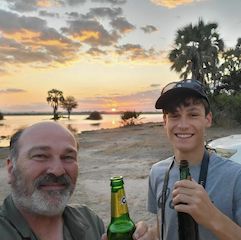
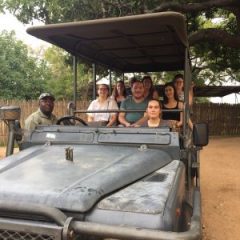

Other projects you might be interested in
Get involved with behaviour and habitat enrichment, wildlife rehabilitation, orphan care and health checks at this small sanctuary project in Malawi.
From £1,500
2 - 12 weeks
Support the conservation of big cats in a responsible way and help mitigate the human-wildlife conflict. Track wild carnivores in a spectacular setting.
From $1,625
2 - 12 weeks
Join a unique conservation programme, dedicated to the protection of the black rhino. Play a vital role in securing the future of these iconic animals.
From $950
1 - 12 weeks
Volunteer at Zimbabwe’s only dedicated primate rehabilitation centre. Gain animal care experience and assist in wildlife rehabilitation and release.

